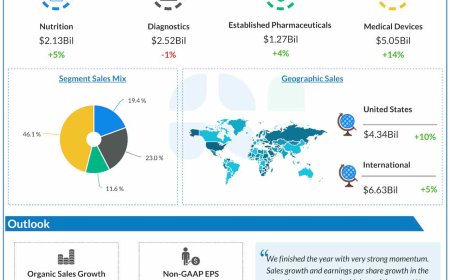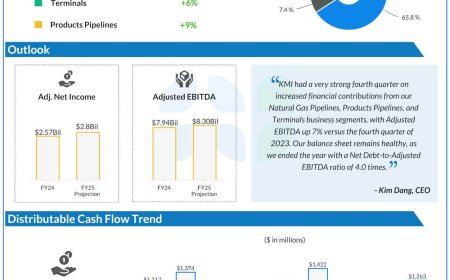Krishna Chaitanya: Redefining Operations in Global Commerce & Transforming Supply Chain Management
Guiding Seamless Product Flow from Manufacturers to Consumers! Navigating the complexities of operations and logistics is essential in the complex world of global commerce. A leader emerges, reshaping the landscape of supply chain management to ensure that products flow seamlessly from manufacturers to consumers. Their influence is felt in many different industries, promoting creativity and […] The post Krishna Chaitanya: Redefining Operations in Global Commerce & Transforming Supply Chain Management appeared first on Insights Success.

Guiding Seamless Product Flow from Manufacturers to Consumers!
Navigating the complexities of operations and logistics is essential in the complex world of global commerce. A leader emerges, reshaping the landscape of supply chain management to ensure that products flow seamlessly from manufacturers to consumers.
Their influence is felt in many different industries, promoting creativity and efficiency while lowering the danger of supply interruptions. Strategic vision and flexibility become crucial assets as businesses confront previously unnoticed difficulties, allowing them to prosper in a constantly changing marketplace. In addition to improving operational performance, their dedication to excellence encourages partnership and flexibility.
With more than five years of substantial expertise in risk management, operational optimization, and strategic supply chain planning, Krishna Chaitanya distinguishes out as a dedicated supply chain specialist. He is committed to developing his knowledge and widening his strategic outlook.
Through research projects and internships, he found his enthusiasm for simplifying manufacturing processes during his Mechanical Engineering studies, which paved the way for his journey into the supply chain industry.
Krishna’s work during the pandemic, managing the supply of essential medical testing kits, underscored the critical role that efficient supply chains play in society.
As a Senior Supply Chain Planner at Cepheid, his innovative approaches and data-driven strategies have positioned him as a leader who not only addresses current challenges but also anticipates future demands in this field.
Let’s know more about his journey:
Krishna Chaitanya: A Dedicated Supply Chain Professional
Krishna is a committed supply chain expert with over five years of extensive experience in strategic supply chain planning, risk management, and operational optimization. He holds a Master’s degree in Industrial Engineering and a Micro Master in Supply Chain Management. Currently, he is pursuing an MBA at the Booth School of Business to enhance his expertise and broaden his strategic perspective.
His interest in the supply chain sector stems from a fascination with the complexities of global logistics. While studying Mechanical Engineering, he was introduced to production and operations management, but it was through internships and research projects focusing on optimizing manufacturing processes and reducing lead times that he recognized the critical importance of efficient supply chains.
What excites him most about this field is its dynamic nature, continually influenced by technological advancements and changing consumer demands. His experience managing the supply of essential medical testing kits during the pandemic highlighted the crucial role supply chains play in societal functions.
Overcoming Supply Chain Challenges
Krishna, a Senior Supply Chain Planner, encountered a significant challenge when unexpected global disruptions led to severe delays in critical raw material supplies. This situation triggered a domino effect, jeopardizing production schedules, inventory levels, and customer deliveries. Recognizing the high stakes involved, he initiated a comprehensive risk assessment to pinpoint vulnerable areas within the supply chain.
He categorized raw materials by their importance and sought alternative sources, engaging with existing suppliers about expedited shipments while exploring new partnerships. He collaborated closely with procurement and manufacturing teams to adjust production priorities, focusing on urgent orders and reallocating resources effectively. Utilizing advanced planning tools, he simulated various scenarios to balance supply constraints with customer demand.
Effective communication was essential; he facilitated regular cross-functional meetings to keep stakeholders aligned and informed. He also implemented real-time dashboards for monitoring inventory levels and order statuses, enabling swift decision-making. These efforts minimized disruption impacts, improved delivery performance, and highlighted the importance of agility, proactive risk management, and collaboration in achieving operational resilience.
Strategies for Effective Stakeholder Communication
Krishna emphasizes that effective communication across departments is crucial for a well-functioning supply chain. One of his primary strategies involves establishing clear and consistent communication channels. He organizes regular cross-functional meetings that bring together stakeholders from procurement, manufacturing, logistics, and sales to align goals, share updates, and tackle challenges collaboratively.
Tailoring communication to the audience is another key strategy. Recognizing that different departments have unique priorities and technical knowledge, he adapts his messaging accordingly. For instance, discussions with the manufacturing team focus on production schedules and capacity planning to ensure relevance.
He leverages data-driven tools such as interactive dashboards and real-time reports to enhance communication. These tools allow stakeholders to visualize key performance indicators (KPIs) and supply chain metrics, fostering transparency and trust among teams.
Building strong relationships with stakeholders is also essential. By understanding their unique challenges and demonstrating empathy, he creates a collaborative environment that encourages open dialogue. He prioritizes active listening and continuous feedback, which not only improves communication but also leads to innovative solutions. These strategies have effectively bridged departmental gaps, ensuring alignment and driving success in supply chain objectives.
Task Prioritization in Supply Chain Management
Krishna emphasizes that effective task prioritization in supply chain management hinges on strategic planning and adaptability. He begins by aligning projects with the business’s overarching goals, prioritizing those that directly impact customer delivery timelines or regulatory compliance.
Utilizing the Eisenhower Matrix, he categorizes tasks by urgency and importance, allowing him to focus on high-priority activities while delegating less critical ones. To track progress and maintain alignment with deadlines, he employs project management tools like Microsoft Project.
Time management is crucial; he breaks larger projects into smaller, manageable tasks with clear milestones, which not only makes the workload more achievable but also fosters a sense of accomplishment as milestones are reached. Regular reviews are integral to his approach, as supply chain dynamics can shift rapidly. By conducting weekly assessments of ongoing projects, he reallocates resources as necessary to remain agile.
Finally, he underscores the significance of delegation and teamwork, empowering his team to leverage their expertise for efficient task completion across multiple projects.
Enhancing Supply Chain Efficiency Through Data Analytics
Krishna effectively utilized data analytics to address inefficiencies in inventory management and enhance forecast accuracy within the supply chain. Faced with the challenge of optimizing stock levels to avoid overstocking and stockouts, he began by collecting and analyzing historical sales data, lead times, and supplier performance metrics.
Using advanced analytics tools, he has developed a forecasting model that incorporated seasonal trends, demand variability, and external factors like market conditions. This model significantly improved the accuracy of demand predictions. He then integrated this forecasting tool with the inventory management system to establish optimal reorder points and safety stock levels for each SKU.
Additionally, he created interactive dashboards that provided real-time insights into inventory health, highlighting potential risks such as slow-moving stock. The immediate impact included improved visibility and informed decision-making, enabling the team to reallocate inventory effectively. This experience underscored the transformative power of data analytics in optimizing supply chain operations and fostering a culture of data-driven decision-making across departments.
Building Strong Supplier Relationships
Krishna emphasizes that cultivating robust relationships with suppliers is vital for a resilient and efficient supply chain. He advocates treating suppliers as strategic partners instead of mere vendors, which fosters open communication, mutual respect, and a shared commitment to common goals.
Regular engagement is essential; he schedules periodic reviews to discuss performance metrics, address issues, and explore improvement opportunities. These meetings also serve as platforms to share long-term visions and align on strategic initiatives like capacity expansion and sustainability goals.
Transparency plays a crucial role in his approach. By sharing relevant data and forecasts with suppliers, he enables them to plan effectively and meet requirements efficiently, thus building trust and enhancing collaboration.
Additionally, he invests in relationship-building activities such as joint training sessions and workshops. These initiatives deepen the understanding of each other’s processes and challenges, ultimately leading to improved collaboration and mutual success in the supply chain.
Key Factors for Successful Demand Forecasting
Krishna identifies several critical factors that contribute to effective demand forecasting, a vital aspect of supply chain management.
Accurate Historical Data: The cornerstone of reliable forecasting is comprehensive historical data, including past sales figures, seasonality trends, and customer buying patterns. Clean, well-organized data enables better analysis and helps identify predictive patterns.
Incorporating Market Intelligence: While historical data is crucial, understanding external factors like economic indicators and competitor activity is equally important. Collaborating with marketing and sales teams ensures these insights refine the forecasting process.
Leveraging Advanced Analytics: Utilizing advanced analytics tools, such as machine learning algorithms and statistical models, enhances forecasting accuracy by processing large datasets to uncover complex patterns.
Cross-Functional Collaboration: Effective demand forecasting requires input from various departments sales, marketing, finance, and operations. Regular communication among these teams leads to more realistic forecasts.
Continuous Monitoring: Demand forecasting is an ongoing process. Regularly reviewing forecast performance against actual outcomes helps refine models and adapt to market changes.
By focusing on these factors, businesses can improve their forecasting reliability, reduce uncertainty, and enhance decision-making across the supply chain.
Advice for Starting a Career in Supply Chain Management
Embarking on a career in supply chain management offers numerous opportunities for learning and growth. Krishna emphasizes the importance of establishing a strong foundation in the fundamentals of the field. Understanding key concepts such as demand planning, inventory management, procurement, and logistics is crucial, as these functions collectively contribute to the overall supply chain. Familiarity with frameworks like the SCOR model and methodologies such as Lean, Just-in-Time (JIT), and Agile provides a structured approach to addressing supply chain challenges.
In today’s data-driven environment, proficiency in technology and analytics is essential. Familiarity with tools like Excel, SAP, and Power BI is important while emerging technologies such as artificial intelligence, machine learning, and blockchain are increasingly relevant. Early hands-on experience with these technologies enhances problem-solving skills and distinguishes professionals in the field.
Adaptability is another vital trait. The supply chain landscape constantly evolves due to market dynamics, technological advancements, and global events. Embracing continuous education through certifications like APICS (now ASCM) can deepen expertise and provide a competitive edge.
Strong communication and collaboration skills are critical in supply chain roles. Working with cross-functional teams requires effective communication to ensure alignment and smooth operations. Building relationships with stakeholders fosters collaboration and leads to better outcomes.
Additionally, cultivating trust and transparency with suppliers, customers, and internal teams is essential for navigating challenges effectively. Long-term partnerships built on mutual respect contribute to a resilient supply chain
Krishna highlights resilience and proactivity as essential traits for managing disruptions. Whether facing natural disasters or unexpected demand surges, maintaining composure under pressure and anticipating risks will set professionals apart.
Networking and mentorship are also pivotal for professional growth. Seeking mentors for guidance and engaging with industry professionals through conferences can expose individuals to new ideas and opportunities.
Finally, patience and persistence are crucial in this vast field. Discovering one’s niche may take time, but each role offers valuable lessons that contribute to development. With dedication and a willingness to learn, aspiring professionals can build a rewarding career in supply chain management.
The post Krishna Chaitanya: Redefining Operations in Global Commerce & Transforming Supply Chain Management appeared first on Insights Success.











































